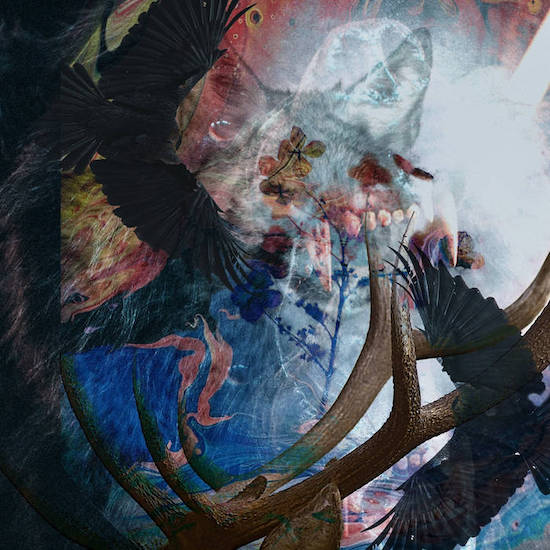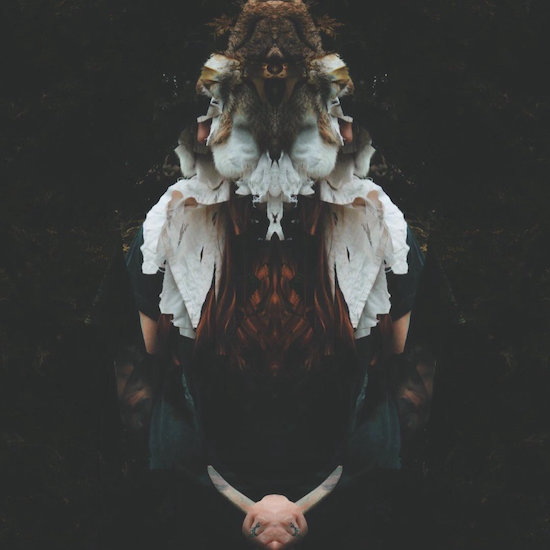
We don’t know who first coined the term “atmospheric black metal”, but it has obviously stuck. Its meaning, however, despite its wide usage, is somewhat vague. It suggests music that is more geared toward the creation of mood or visions kindled in the imagination than, well, music based more centrally on riffs and riots. But that still leaves a lot un-defined.
The vagueness of the term makes it a big umbrella, or a big tent, or whatever you want to call a canopy that covers a lot of people and the different things they’re doing, including people whose activities spill them outside the covering.
Which brings us to Michigan-based Crown of Asteria, the distinctive solo project of the musically prolific Meghan Wood. Now more than 10 years into its existence, Crown of Asteria has amassed a lengthy discography, one that has exhibited as much experimentation as it has been threaded with through-lines.
But while no year has passed since Crown of Asteria‘s inception without something new from the project (and usually several or many somethings), it’s been more than five years since the last full album — a span that will be closed on April 12th with Fiadh Productions‘ release of a new Crown of Asteria album named Cypher, which is the subject of today’s premiere.

It’s fair to say that Crown of Asteria‘s past music has been covered by the big tent of “atmospheric black metal”, but has also spilled outside into different and even more difficult-to-define environs, and there’s certainly a lot of spill evident in Cypher. Meghan Woods‘ own preview of the album is suggestive of that, but more intriguing than precisely definitive:
“Cypher keeps itself cloaked and guarded from succinct observation and exploration. It is a mystery governed by nothing but by whom it is meant as a devotional gift. Those that rally to the call may find gateways observed from a distance. Rather than to stand before it triumphantly spouting its riddles, spells and golden psalms you feel guidance to a deeper chasm.”
The album is a substantial one, encompassing five long tracks (some of them very long) and a relatively short interlude composed and recorded by Todd Paulson of Canis Dirus (with whom Meghan has collaborated in Another Black Autumn). On the first three of those songs Meghan is accompanied on cello by Kakophonix of Hvile I Kaos.
In providing a further preview of what you’ll encounter, beyond Meghan Woods‘ own mysterious words, we need to quickly backtrack on something suggested up above — because you will encounter riffs and riots, as well as big booming beats and gut-slugging low frequencies. It’s just that they’re usually shrouded in other sensations that definitely do alter moods and kindle the imagination, spawning frightening supernatural or celestial visions.
Meghan sings from time to time, and even then her ghostly voice contributes to the music’s eerie and unearthly atmosphere, but it’s her reverberating bestial snarls, screams, and roars that really put the hair up on the back of our necks — scary experiences made even more scary by elaborate layerings of weirdly wailing and warping tonalities of unsettling dissonance.
Apart from spawning terrifying visions, the music alters moods in other ways too, creating episodes of menace and fear, of tension and turmoil, of mortification and misery. When the riots come, they manifest in cacophonous voices (some seemingly engaged in demonic conversations and strange echoing proclamations), frantic upheavals in the low end, and swirling vortices of shrill and searing instrumentation.
But gleaming notes also ring and slowly meander, beckoning the listener like the maneuvering of some celestial serpent — still scary but also seductive — and ambient synths cause glimmering and glittering sonic cascades, like the slow wafting of an aurora borealis or an advance deeper into the cosmos, creating panoramic visions of extraterrestrial wonder while a bass muses and murmurs. (And you might hear the rippling dance of a mandolin too.)
Sometimes the music is simple, but mostly it’s strikingly elaborate, and unpredictable in its mutations. And while the music is sometimes backed by primal rhythms (as well as others that undulate or frolic), all the many sensations that flower and frenzy around them are hallucinatory. Even when those sensations become mesmerizing, however, they’re still frightening, and when they reach crescendos of calamity they’re truly terrorizing.
In past works Crown of Asteria has integrated strands of folk music. There’s very little of that in Cypher — in fact, it’s really only evident in the acoustic strumming in Todd Paulson‘s interlude song, “Southern Citadel: Lapis Lazuli, Silver, and Wood”, though that song too still sounds out of this world. There is instead a greater emphasis placed on ambient music, which significantly contributes to the album’s profoundly unearthly atmosphere — unearthly in two senses, conjuring both visions of the cosmos and nightmares.
Well, that was a lot of words, wasn’t it? Let’s boil it all down into two: Cypher is splendidly chilling. Now see for yourselves:
Todd Paulson also mixed and mastered Cypher. It’s available for pro-order now at Fiadh’s Bandcamp, and a glance at that page shows that lots of folks have already availed themselves of the opportunity even before today’s full stream got out into the world.
PRE-ORDER:
https://fiadh.bandcamp.com/album/cypher
CROWN OF ASTERIA:
https://crownofasteria.bandcamp.com/
https://instagram.com/crownofasteria
